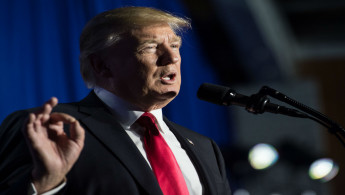Trump defends torture, could reinstate CIA's secret prisons
US President Donald Trump on Wednesday defended CIA torture techniques amid reports that he intends to reinstate the use of CIA secret prisons, also known as “black sites”.
In an interview with ABC News, Trump said he believes torture works and that "we have to fight fire with fire."
The Republican president went on to say that the Islamic State group "chop off the citizens' or anybody's heads in the Middle East, because they're Christian or Muslim or anything else."
“We have that and we're not allowed to do anything. We're not playing on an even field," he added.
Trump said he will confer with Defence Secretary James Mattis and CIA director Mike Pompeo to determine if they want to use torture techniques and what can be done legally.
Trump’s statements on torture comes amid reports of a draft executive order that would lead to a major review of America's methods for interrogating terror suspects and the possible reopening of CIA-run secret prisons outside the US, also know as "black site" prisons.
The black sites were used to detain suspects who were captured in the "war on terrorism" launched by former President George W. Bush after the September 11, 2001 attacks.
The now defunct programme's “Enhanced Interrogation Techniques”, a term used for torture, which included simulated drowning known as water boarding, were heavily criticised around the world and deemed unlawful by legal experts.
Former President Barack Obama and other senior US officials denounced water boarding as torture.
The AP obtained the draft order from a US official, who said it had been distributed by the White House for consultations before Trump signs it.
The official wasn't authorised to speak publicly on the matter and demanded anonymity.
The order would also reverse America's commitment to closing the US detention facility in Guantanamo Bay, Cuba, and instruct the Pentagon to send newly captured "enemy combatants" to the site.
However, the White House sought to distance itself from the draft order on Wednesday afternoon, amid growing opposition to its contents by lawmakers and senior US figures.
White House spokesman Sean Spicer said the draft "is not a White House document," adding that he has "no idea where it came from."




 Follow the Middle East's top stories in English at The New Arab on Google News
Follow the Middle East's top stories in English at The New Arab on Google News

![A group of Palestinians, foreign and Israeli activists gather to participated in an olive picking event on the land in the town of Battir, which is under threat of confiscation by Israel in Bethlehem, occupied West Bank on 8 November 2024. [Getty]](/sites/default/files/styles/image_330x185/public/2182930803.jpeg?h=199d8c1f&itok=__0LgGsa)
